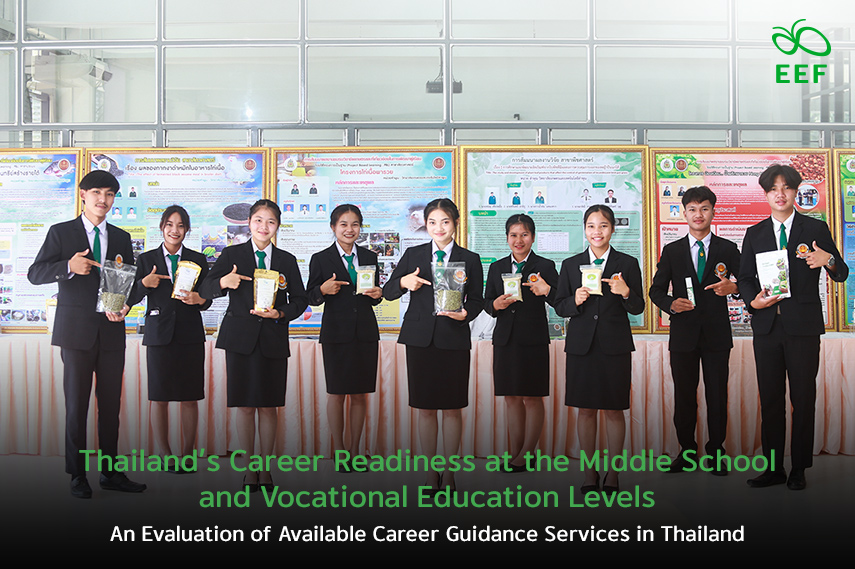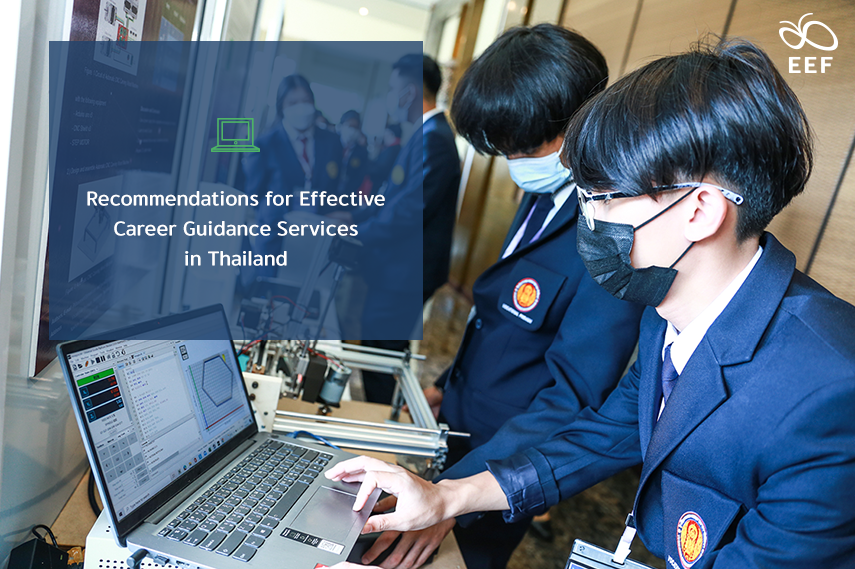
In Thailand, young individuals face significant challenges that hinder their progress, leaving them vulnerable and limiting their rights. A considerable proportion of Thai adolescents and youth — approximately 15% — are not engaged in education, employment, or training (NEET), posing a pressing issue for their transition from education to employment. This situation increases the risk of socioeconomic exclusion and long-term vulnerability. To address these challenges, career development support is crucial. It plays a vital role in enhancing young individuals’ skills in managing their education, employment, livelihood, and transitions throughout their lives.
Career guidance, counseling, and information are instrumental in achieving lifelong learning goals, improving labor market outcomes, and promoting social equity and inclusion. Understanding the current landscape of career guidance services is essential to develop impactful interventions in Thailand. This entails identifying available services, addressing gaps and challenges, and improving the delivery of career guidance through diversified approaches, resource allocation, leadership enhancement, partnerships, and strategies for reaching marginalized youth.
Thailand offers diverse career guidance services through government agencies, such as the Ministry of Education and the Ministry of Labor, as well as the Thailand Professional Qualification Institute (TPQI). Social enterprises and civil society organizations also contribute to career guidance through innovative programs tailored to labor market trends and targeted interventions. These services cater to different education levels and focus on skill assessment, career information, training, and capacity building. Their collective goal is to empower individuals in making informed decisions about their career paths.

Career Guidance Services Available in Thailand
- Government:
-
- Ministry of Education:
1. Career guidance curricula development services for primary to high school levels and vocational education through educational institutions;
2. Programs including career guidance classes, career talks, and workplace visits,
- Ministry of Education:
-
- Ministry of Labor:
1. Career guidance services for dropouts and out-of-school youth through Provincial Labor Offices;
2. Programs include career information, skill and career training, job fair, and career and employment counseling.
- Ministry of Labor:
-
- Thailand Professional Qualification Institute (TPQI):
1. Skill assessment and online career information and education;
2. Onsite and online training;
3. Certification of occupational and competency standards.
- Thailand Professional Qualification Institute (TPQI):
- Social Enterprise:
- Career guidance services through innovative programs developed based on labor market trends with a focus on enhancing employability and future readiness;
- Services including skill assessment, career information and education, career talk, job shadowing, job application preparation, short course training, and capacity building;
- Civil Society Organization (CSOs):
- Career guidance services in rural, remote, and conflict-affected areas where government programs may be limited with a focus on career skill training and marketing;
- Programs include income-generating and capacity-building programs.
Career guidance services in Thailand encounter a range of challenges that impact their effectiveness. These challenges pertain to coordination, funding, quality and content, parental involvement, human resources, information management, accessibility, and technology utilization. Addressing these obstacles is crucial to enhancing the overall efficacy and inclusiveness of career guidance. By tackling these broad challenges, stakeholders can ensure comprehensive and impactful career guidance services for individuals in Thailand.

Challenges in Career Guidance Services in Thailand:
- Coordination:
- Lack of systematic, long-term collaboration between the Ministry of Labor and the Ministry of Education, as well as the public and private sectors.
- Fragmented implementation and limited research and information sharing and subsequent lack of labor market data for effective provision.
- Funding:
- Challenges in securing long-term funding for government organizations, social enterprises, and CSOs.
- Government budget proposals becoming outdated due to rapid labor market changes.
- Short-term funding options for social enterprises and CSOs hinder program sustainability.
- Quality:
-
- Content:
- Content limitations in government schools, focusing on specific sectors and lacking career options, and subsequently limited students’ knowledge, choices, and outlooks.
- Lagging behind current labor market trends and individual ambitions or preferences.
- Insufficient guidance for self-discovery, and limited information on rights and welfare.
- Content:
-
- Parental Involvement:
- Varying quality of parental involvement.
- Parental perceptions influencing students’ career choices.
- Parental Involvement:
-
- Human Resources:
- Student counselors are overloaded with primary responsibilities.
- The limited availability of student counselors leads to a low counselor-student ratio.
- Challenges in staying updated with labor market trends.
- Human Resources:
-
- Information Management Mechanisms:
- Limited utilization of data for evidence-based programming;
- Lack of knowledge and resources for teachers to benefit students.
- Insufficient monitoring and evaluation of career guidance provision.
- Information Management Mechanisms:
-
- Labor Market Information:
- Formal style and academic papers dominate labor market information.
- Need for more user-friendly and youth-friendly formats.
- Labor Market Information:
-
- Access:
- Varied methods of delivery based on service models, objectives, and client needs.
- Limited ICT literacy and internet access affect online services.
- Urban-rural divide and barriers for youth with disabilities or language barriers.
- Technology:
- Increasing opportunities through electronic devices and the internet.
- Concerns about media literacy and discerning appropriate information.
- Need for a centralized information platform for job-related information and connections.
To enhance the effectiveness of career guidance services in Thailand, several recommendations can be implemented. These recommendations aim to promote diversity in services and delivery methods, improve service types and delivery, allocate resources effectively, strengthen leadership, foster partnerships, and reach marginalized youth. By adopting these measures, career guidance in Thailand can become more inclusive and responsive to the needs of individuals. It will empower them with tailored support, improved access to information, and enhanced opportunities for career exploration and development.

Recommendations for Effective Career Guidance Services in Thailand:
- Enhance Diversity in Services and Delivery Methods:
- Improve Service Types:
- Improve range and suitability of career guidance programs based on target assessments.
- Utilize data from self-assessment programs to develop tailored services.
- Increase adolescent and youth participation in service design.
- Provide opportunities for work simulations and learning tasters.
- Support parental involvement and capacity building.
- Establish safe spaces for open expression and confidence-building workshops.
- Incorporate future studies and labor rights/welfare information.
- Improve Service Delivery Method:
- Collect data on student-counselor challenges and student-to-counselor ratios.
- Increase qualified student counselors and reduce additional duties.
- Enhance counselor competencies through capacity building.
- Update staff manuals and address network limitations.
- Strengthen monitoring and evaluation (M&E) of career guidance programs.
- Integrate gender and cultural sensitivity approaches.
- Reduce gender stereotyping in training and counseling.
- Consider the pilot labor intelligence system for comprehensive information.
- Improve Service Types:
- Enhance Resource Allocation:
- Increase flexibility in budget planning for relevant and resilient programs.
- Foster public-private partnerships for innovative provision of guidance and skills development.
- Establish long-term funding options for social enterprises and CSOs.
- Improve Leadership:
- Conduct practitioner consultations for insights and support requirements.
- Secure commitments for leadership improvement.
- Establish a strategic leadership organization/committee at the national level.
- Foster Partnerships:
- Establish a multi-stakeholder platform for collaboration and resource mobilization.
- Create a national career guidance working group/committee.
- Encourage co-research and co-assessment for better understanding.
- Reach Marginalized Youth:
- Enhance outreach strategies through social media and youth-friendly formats.
- Improve access to training programs for marginalized youth.
- Conduct research on NEET youth and design targeted interventions.
- Develop independent participation programs for adolescents and youth.
- Publish labor market information in youth-friendly formats.
- Conduct research on the needs of youth with disabilities.
- Improve access to career information and services for youth with disabilities.
Enhancing career guidance services in Thailand is crucial to address the challenges faced by young individuals in their education-to-employment transition. By diversifying service types, improving service delivery methods, and allocating resources effectively, Thailand can create a more inclusive and impactful career guidance system. Strengthening leadership, fostering partnerships, and reaching marginalized youth through targeted interventions are essential steps toward promoting social equity and inclusion. Moreover, leveraging technology and media literacy can enhance access to information and improve the overall quality of career guidance services.
The Equitable Education Fund (EEF) Thailand is a leading organization dedicated to promoting equity and inclusivity in education. Through initiatives like the Zero Dropout program, EEF supports the enhancement of career guidance services by addressing challenges faced by young individuals in their education-to-employment transition. By providing resources, funding, and expertise, EEF empowers stakeholders to implement recommendations and build a more effective and inclusive career guidance system, ensuring equal opportunities for all individuals in Thailand to make informed decisions about their future paths.
Source:
Mapping of career guidance services and interventions for adolescents and youth in Thailand. UNICEF. https://www.unicef.org/thailand/reports/mapping-career-guidance-services-and-interventions-adolescents-and-youth-thailand

